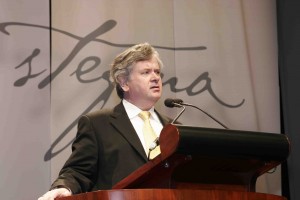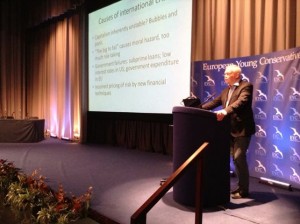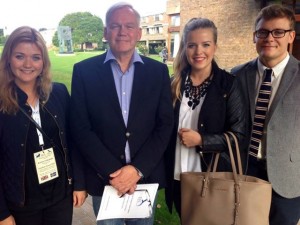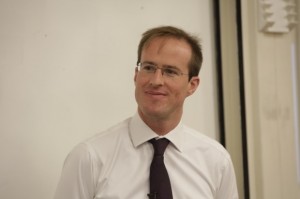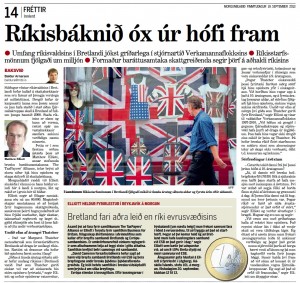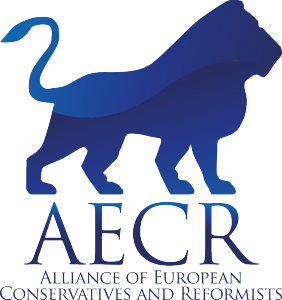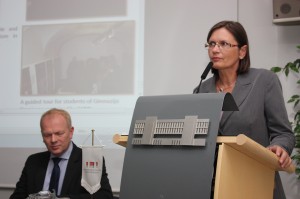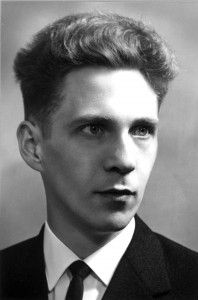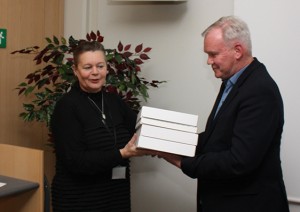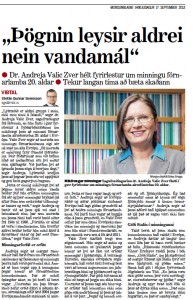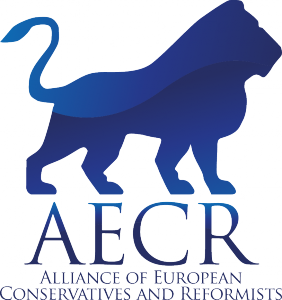 An international conference on the Icelandic bank collapse, five years on, will take place in Reykjavik Monday 7 October 2013, 17–19, in meeting room N-132 in Askja, the Natural Sciences House of the University of Iceland. Dr. Eamonn Butler analyses the causes of the international financial crisis. He has published many papers on this topic, for example in Verdict on the Crash in 2009. Dr. Pythagoras Petratos describes the situation in Cyprus—a European island like Iceland, but a member of the EU and the eurozone, unlike Iceland. Professor Hannes H. Gissurarson provides explanations for the Icelandic bank collapse and argues against some accounts of it which are not, in his view, supported by the evidence. Dr. Asgeir Jonsson discusses the aftermath of the bank collapse. Ms. Asta Moller, director of the Institute of Public Administration and Politics (and a former MP for the Independence Party), chairs the meeting, and Dr. Stefania Oskarsdottir, Assistant Professor of Politics at the University of Iceland, responds to the papers. The meeting is open and admission is free. This event forms a part of the joint RNH-AECR project on “Europe, Iceland and the Future of Capitalism”.
An international conference on the Icelandic bank collapse, five years on, will take place in Reykjavik Monday 7 October 2013, 17–19, in meeting room N-132 in Askja, the Natural Sciences House of the University of Iceland. Dr. Eamonn Butler analyses the causes of the international financial crisis. He has published many papers on this topic, for example in Verdict on the Crash in 2009. Dr. Pythagoras Petratos describes the situation in Cyprus—a European island like Iceland, but a member of the EU and the eurozone, unlike Iceland. Professor Hannes H. Gissurarson provides explanations for the Icelandic bank collapse and argues against some accounts of it which are not, in his view, supported by the evidence. Dr. Asgeir Jonsson discusses the aftermath of the bank collapse. Ms. Asta Moller, director of the Institute of Public Administration and Politics (and a former MP for the Independence Party), chairs the meeting, and Dr. Stefania Oskarsdottir, Assistant Professor of Politics at the University of Iceland, responds to the papers. The meeting is open and admission is free. This event forms a part of the joint RNH-AECR project on “Europe, Iceland and the Future of Capitalism”.
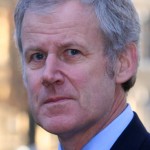 Eamonn Butler has degrees in philosophy, economics and psychology, and a doctorate from St. Andrews University in Scotland. He was a member of the staff of the US House of Representatives before he founded, with Madsen Pirie, the Adam Smith Institute in 1977: its purpose is to educate the public about free markets and economic policy, and to inject sound ideas into the public debate. Dr. Butler is the secretary of the Mont Pelerin Society, an international association of conservative and classical liberal scholars. The author of many books, including introductions to the economic and political ideas of Milton Friedman, Friedrich A. Hayek and Ludwig von Mises, in 2009 he published The Rotten State of Britain where he criticized the Labour government of the day for having invoking the anti-terrorism law against Iceland, Britain’s best friend in Europe, as he said.
Eamonn Butler has degrees in philosophy, economics and psychology, and a doctorate from St. Andrews University in Scotland. He was a member of the staff of the US House of Representatives before he founded, with Madsen Pirie, the Adam Smith Institute in 1977: its purpose is to educate the public about free markets and economic policy, and to inject sound ideas into the public debate. Dr. Butler is the secretary of the Mont Pelerin Society, an international association of conservative and classical liberal scholars. The author of many books, including introductions to the economic and political ideas of Milton Friedman, Friedrich A. Hayek and Ludwig von Mises, in 2009 he published The Rotten State of Britain where he criticized the Labour government of the day for having invoking the anti-terrorism law against Iceland, Britain’s best friend in Europe, as he said.
 Pythagoras Petratos has degrees in finance, economics of health and European politics, and a doctorate from the University of London. His dissertation was on the valuation of new technologies with particular reference to private equity and venture capital, examining also regulation and business cycles. He has been a Visiting Professor at many universities in his homeland Greece, including the University of the Peloponnese, the University of Crete and the University of Thessalia, as well as at Cambridge University. Presently teaching finance at the Said School of Business at Oxford University, Dr. Petratos has published scholarly papers in many fields, including European security and the regulation of new technology.
Pythagoras Petratos has degrees in finance, economics of health and European politics, and a doctorate from the University of London. His dissertation was on the valuation of new technologies with particular reference to private equity and venture capital, examining also regulation and business cycles. He has been a Visiting Professor at many universities in his homeland Greece, including the University of the Peloponnese, the University of Crete and the University of Thessalia, as well as at Cambridge University. Presently teaching finance at the Said School of Business at Oxford University, Dr. Petratos has published scholarly papers in many fields, including European security and the regulation of new technology.
 Hannes H. Gissurarson has degrees in philosophy, history and politics, and a doctorate from the University of Oxford, where he was for two years the R. G. Collingwood Scholar at Pembroke College. His dissertation was on the combination of conservative insights and classical liberal principles in the political thought of Friedrich A. Hayek. Professor of Politics at the University of Iceland, he sat on the board of the Mont Pelerin Society—an international assocation of conservative and classical liberal scholars—in 1998–2004 and on the supervisory board of Iceland’s Central Bank in 2001–9. He is a member of RNH’s Academic Council. The author of several books, including Hayek’s Conservative Liberalism, Overfishing: The Icelandic solution, biographies of Jon Thorlaksson (Prime Minister and Founder of the Independence Party), Benjamin Eiriksson (Joseph Schumpeter’s student and a leading free market economist in Iceland) and Halldor K. Laxness (Iceland’s Nobel Laureate in literature), Professor Gissurarson is now working on a book in English on the Icelandic bank collapse. He is a frequent contributor to the Wall Street Journal, for example on the Icesave dispute, the trial of former Prime Minister Geir H. Haarde, the 2009–2013 left-wing government and the 2013 parliamentary elections.
Hannes H. Gissurarson has degrees in philosophy, history and politics, and a doctorate from the University of Oxford, where he was for two years the R. G. Collingwood Scholar at Pembroke College. His dissertation was on the combination of conservative insights and classical liberal principles in the political thought of Friedrich A. Hayek. Professor of Politics at the University of Iceland, he sat on the board of the Mont Pelerin Society—an international assocation of conservative and classical liberal scholars—in 1998–2004 and on the supervisory board of Iceland’s Central Bank in 2001–9. He is a member of RNH’s Academic Council. The author of several books, including Hayek’s Conservative Liberalism, Overfishing: The Icelandic solution, biographies of Jon Thorlaksson (Prime Minister and Founder of the Independence Party), Benjamin Eiriksson (Joseph Schumpeter’s student and a leading free market economist in Iceland) and Halldor K. Laxness (Iceland’s Nobel Laureate in literature), Professor Gissurarson is now working on a book in English on the Icelandic bank collapse. He is a frequent contributor to the Wall Street Journal, for example on the Icesave dispute, the trial of former Prime Minister Geir H. Haarde, the 2009–2013 left-wing government and the 2013 parliamentary elections.
 Asgeir Jonsson has degrees in economic thought and economic history, and a doctorate in international finance from Indiana University. He edited the business paper Visbending in 1995–6 and worked for the Economic Research Institute at the University of Iceland 2000–4, before becoming Head of Economic Research at Kaupthing, the largest Icelandic commercial bank. After the 2008 bank collapse, he became Assistant Professor of Economics at the University of Iceland. In 2009, Dr. Jonsson published Why Iceland? How One of the World’s Smallest Countries Became the Meltdown’s Biggest Casualty, widely regarded as the best book on the Icelandic bank collapse. He is now working on a book in English on the aftermath of the collapse.
Asgeir Jonsson has degrees in economic thought and economic history, and a doctorate in international finance from Indiana University. He edited the business paper Visbending in 1995–6 and worked for the Economic Research Institute at the University of Iceland 2000–4, before becoming Head of Economic Research at Kaupthing, the largest Icelandic commercial bank. After the 2008 bank collapse, he became Assistant Professor of Economics at the University of Iceland. In 2009, Dr. Jonsson published Why Iceland? How One of the World’s Smallest Countries Became the Meltdown’s Biggest Casualty, widely regarded as the best book on the Icelandic bank collapse. He is now working on a book in English on the aftermath of the collapse.
In the evening, Monday 7 October, the annual RNH Freedom Dinner will take place, with David Oddsson, editor of Morgunbladid, as speaker. Oddsson was Mayor of Reykjavik in 1982–91, Prime Minister in 1991–2004, Foreign Minister in 2004–5, and one of the three Governors of Iceland’s Central Bank in 2005–9. At a breakfast meeting of the Icelandic Chamber of Commerce in November 2007, Governor Oddsson said: “Iceland is becoming uncomfortably beleaguered by foreign debt. At a time when the Icelandic government has rapidly reduced its debt and the Central Bank’s foreign and domestic assets have increased dramatically, other foreign commitments have increased so much that the first two pale into insignificance in comparison. All can still go well, but we are surely at the outer limits of what we can sustain for the long term.” Five years ago, in the evening of 7 October 2008 Governor Oddsson appeared in a famous television interview (partly available here on Youtube with English captions) where he outlined a rescue plan for Iceland, which was to draw a fence around the Icelandic part of the banking sector, and to put its foreign part into receivership. While his advice was essentially taken, shortly thereafter Oddsson was driven out of office. In his speech, Oddsson will return to those dramatic days in October 2008. The dinner is already sold out.
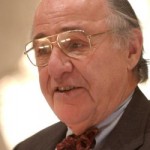 RNH also supports and promotes a lecture the very same day, Monday 7 October 2013, in the festivities hall of the University of Iceland, 12–13.30, given by Professor Robert Aliber on small nations like Iceland in the international financial system. Professor Aliber holds a doctorate from Yale University and taught international finance at the University of Chicago in 1965–2004 where he worked with Milton Friedman and other renowned economists. Aliber gave a historic paper in Iceland 5 May 2008 when he said to his astonished audience, “Your banks are dead!” He regarded it as only a question of when, but not if, a run would be made on the Icelandic banks. Iceland was, he said, experiencing an asset bubble which had been caused by a massive injection of foreign credit into the economy. When he was asked for evidence, his answer was, “Count the cranes!” Professor Aliber’s analysis was not well-received by all: the Chief Economist of Iceland’s Central Bank, Arnor Sighvatsson, protested for example vehemently against Aliber at that meeting. After this memorable episode, Aliber has visited Iceland several times.
RNH also supports and promotes a lecture the very same day, Monday 7 October 2013, in the festivities hall of the University of Iceland, 12–13.30, given by Professor Robert Aliber on small nations like Iceland in the international financial system. Professor Aliber holds a doctorate from Yale University and taught international finance at the University of Chicago in 1965–2004 where he worked with Milton Friedman and other renowned economists. Aliber gave a historic paper in Iceland 5 May 2008 when he said to his astonished audience, “Your banks are dead!” He regarded it as only a question of when, but not if, a run would be made on the Icelandic banks. Iceland was, he said, experiencing an asset bubble which had been caused by a massive injection of foreign credit into the economy. When he was asked for evidence, his answer was, “Count the cranes!” Professor Aliber’s analysis was not well-received by all: the Chief Economist of Iceland’s Central Bank, Arnor Sighvatsson, protested for example vehemently against Aliber at that meeting. After this memorable episode, Aliber has visited Iceland several times.


